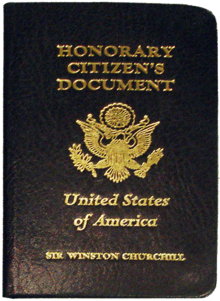Honorary citizenship of the United States
This article is missing information about Error: you must specify what information is missing.. (May 2011) |

A person of exceptional merit, generally a non-United States citizen, may be declared an Honorary Citizen of the United States by an Act of Congress, or by a proclamation issued by the President of the United States, pursuant to authorization granted by Congress.
Seven people have been so honored, five posthumously, and two, Winston Churchill and Mother Teresa, during their lifetimes.
Recipients
The recipients are:
- Winston Churchill (1874–1965), British Prime Minister, enacted on April 9, 1963[2][3]
- Raoul Wallenberg (1912–1947), Swedish diplomat who rescued Jews in the holocaust, enacted on October 5, 1981, posthumously[4]
- William Penn (1644–1718), English real estate entrepreneur, and founder and "absolute proprietor" of the Province of Pennsylvania, the English North American colony and the future Commonwealth of Pennsylvania, enacted on October 19, 1984, posthumously[5]
- Hannah Callowhill Penn (1671–1726), second wife of William Penn, administrator of the Province of Pennsylvania, enacted on October 19, 1984, posthumously[5]
- Mother Teresa (1910–1997), Catholic nun of Albanian ethnicity and Indian citizenship, who founded the Missionaries of Charity in Calcutta, India, enacted on October 1, 1996[6]
- Marie Joseph Paul Yves Roche Gilbert du Motier (1757–1834), the Marquis de Lafayette or General Lafayette, a Frenchman who was an officer in the American Revolutionary War, enacted August 6, 2002, posthumously[7]
- Casimir Pulaski (1745–1779), Polish military officer who fought on the side of the American colonists against the British in the American Revolutionary War; member of the Polish–Lithuanian Commonwealth nobility, politician who has been called "The Father of the American Cavalry",[8][9] enacted on November 6, 2009, posthumously[10][11]
For Lafayette and Mother Theresa, the honor was proclaimed directly by an Act of Congress. In the other cases, an Act of Congress was passed authorizing the President to grant honorary citizenship by proclamation.
Legal issues

Lafayette did not receive honorary citizenship of the United States until 2002, but did become a natural born citizen during his lifetime. On 28 December 1784, the Maryland General Assembly passed a resolution stating that Lafayette and his male heirs "forever shall be...natural born Citizens" of the state.[12] This made him a natural born citizen of the United States under the Articles of Confederation and as defined in Section 1 of Article Two of the United States Constitution.[13][14][15][2] In 1803 and 1804, President Jefferson offered to make him Governor of Louisiana,[16] and in 1932, descendant René de Chambrun established his American citizenship based on the Maryland resolution.[17][18] For the others, what rights honorary citizenship bestows, if any, is unclear; it does not grant eligibility for United States passports.[1]
Honorary citizenship should not be confused with citizenship or permanent residency bestowed by a private bill. Private bills are, on rare occasions, used to provide relief to individuals, often in immigration cases, and are also passed by Congress and signed into law by the President. One such statute, granting Elian Gonzalez U.S. citizenship, was suggested in 1999, but was never enacted.[19]
See also
Notes
- ^ a b "7 FAM 1171: Honorary Citizenship" (PDF). Foreign Affairs Manual Volume 7 – Consular Affairs. U.S. Department of State. 9 April 2008. Retrieved 2 February 2011.
- ^ a b Plumpton, John (Summer 1988). "A Son of America Though a Subject of Britain". Finest Hour (60). The Churchill Centre.
- ^ "Winston Churchill" (PDF). Pub.L. 86-6. U.S. Senate. 9 April 1963. Retrieved 2 February 2011.
- ^ "Raoul Wallenberg" (PDF). Pub.L. 97-54, 95 Stat. 971. U.S. Senate. 5 October 1981. Retrieved 2 February 2011.
- ^ a b "William Penn and Hannah Callowhill Penn" (PDF). Pub.L. 98-516, 98 Stat. 2423. U.S. Senate. 19 October 1984. Retrieved 2 February 2011.
- ^ H.J. Res. 191 (Pub. L. 104–218 (text) (PDF), 110 Stat. 3021, enacted October 1, 1996)
- ^ S.J. Res. 13 (Pub. L. 107–209 (text) (PDF), 116 Stat. 932, enacted August 6, 2002)
- ^ "Casimir Pulaski Day". Office of Civil Rights and Diversity at Eastern Illinois University. 2005. Retrieved 2 February 2011.
- ^ Richmond, Yale (1995). From Da to Yes: Understanding the East Europeans. Yarmouth, Me: Intercultural Press. p. 72. ISBN 1877864307.
- ^ "Citizenship for Polish Hero of American Revolution". The New York Times. Associated Press. 7 November 2009. Retrieved 2009-11-19.
Gen. Casimir Pulaski finally became an American citizen, 230 years after he died fighting in the Revolutionary War.
- ^ H.J. Res. 26 (S.J. Res. 12) (Pub. L. 111–94 (text) (PDF), 123 Stat. 2999, enacted November 6, 2009)
- ^ Lafayette again became an honorary citizen of Maryland in 1823, as well as of Connecticut the same year.
- ^ Speare, Morris Edmund (7 September 1919). "Lafayette, Citizen of America". The New York Times. Retrieved 2 February 2011.
- ^ Folliard, Edward T. (25 May 1973). "JFK Slipped on Historical Data In Churchill Tribute". Sarasota Journal. Retrieved 2 February 2011.
- ^ Cornell, Douglas B. (10 April 1963). "Churchill Acceptance 'Honors Us Far More'". The Sumter Daily Item. Retrieved 2 February 2011.
- ^ "Lafayette's Triumphal Tour: America, 1824-1825". Lafayette: Citizen of Two Worlds. Cornell University Library. 2006. Retrieved 2 February 2011.
- ^ "Letters". TIME. 2 December 1940. Retrieved 2 February 2011.
- ^ Rogister, John (17 August 2002). "Obituaries: René de Chambrun". The Independent. Retrieved 2 February 2011.
- ^ Bash, Dana (23 December 1999). "Helms says he aims to offer U.S. citizenship to Elian Gonzalez". CNN. Retrieved 2 February 2011.
